International Women's Day: Closing the online gender gap
- Published
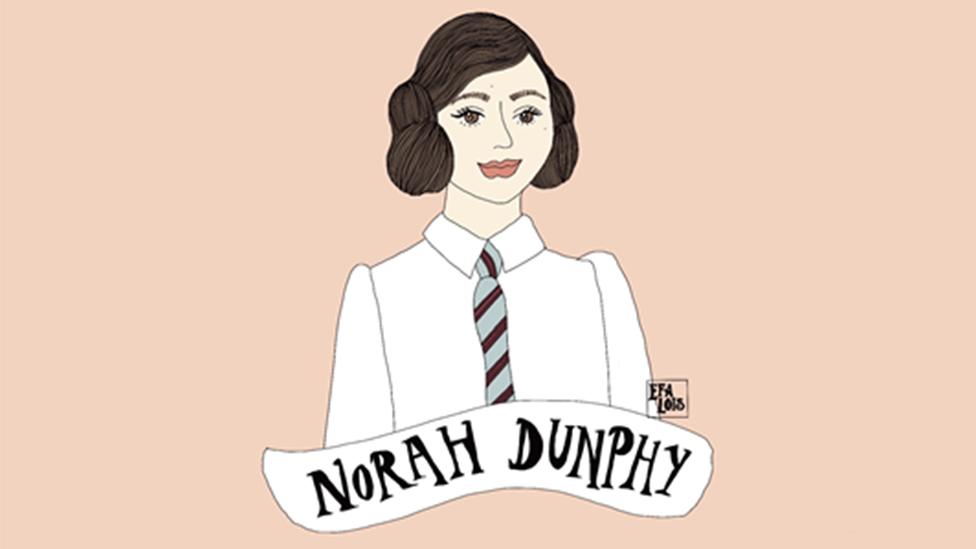
A Welsh blogger is unearthing the stories of forgotten Welsh women like Norah Dunphy, thought to be the first woman in Britain to achieve a degree in architecture
Women have been underrepresented throughout history and the internet is no different. On International Women's Day, Kate Rimmington takes a look at the efforts of volunteers dedicated to raising their online profile.
When 24-year-old artist and illustrator Efa Lois was studying architecture she noticed the lack of female role models in the field. Working as an illustrator alongside her degree, she began to realise this was not just a problem in architecture.
"I was having conversations and realised I didn't know much about Welsh women in the history of Wales and the people I was speaking to didn't know much either."
She finished her degree and began working for the Design Commission, but in her spare time she started researching, writing and illustrating a bilingual blog called Drudwen, external to record notable Welsh women through history.
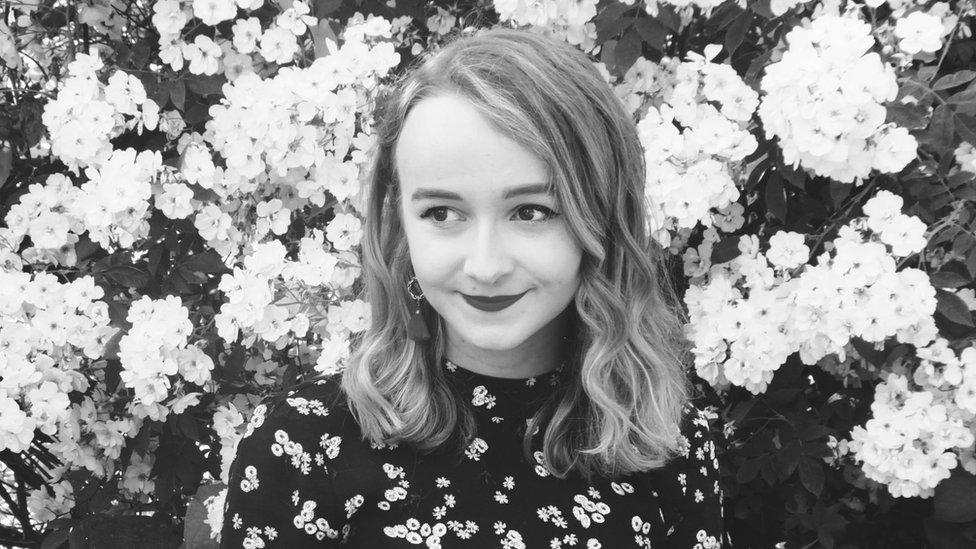
Efa Lois enjoys rooting around archives so she can recount the stories of forgotten women in Welsh history
Her first subjects were Gwenllian Morgan from Brecon, the first woman in Wales to be a mayor, and artist Gwen John from Haverfordwest, who received much less attention than her brother Augustus John, external.
Ms Lois, who is originally from Aberystwyth and now lives in Cardiff, now welcomes contributions from other people, which are then fact-checked, and the blog now features 59 women.
On a much larger scale, the Wikimedia Foundation, external, the non-profit organisation that runs online encyclopaedia Wikipedia, has acknowledged the poor representation of women in its own coverage, mirroring society's gender bias. Fewer than 20% of its volunteer contributors and editors are women.
The organisation is currently running a #WikiHerStory initiative to encourage volunteers to help close the online gender gap, but the issue is a long-running problem.
Its executive director Katherine Maher wrote about the issue in 2018, external, recalling how high-flying physicist Donna Strickland was not deemed to be "notable" under Wikipedia's criteria until she won a Nobel prize, because previously there had not been enough coverage of her work in "independent secondary sources", such as press articles.
However, Ms Maher added: "There is only so much Wikipedia itself can do. To fix Wikipedia's gender imbalance, we need our contributors and editors to pay more attention to the accomplishments of women."
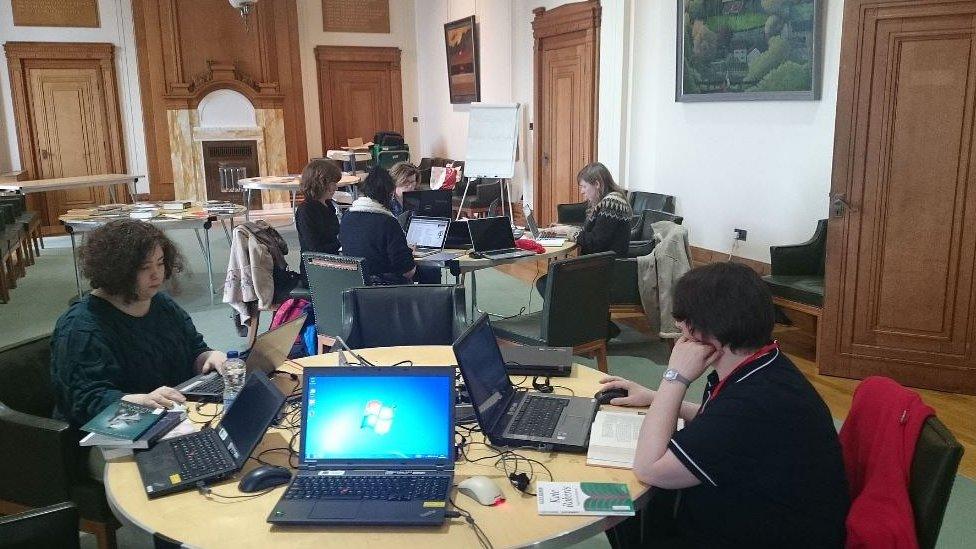
Volunteers at a Wikipedia editing event in 2016 in the National Library of Wales
The Welsh language Wicipedia, external community has answered this call.
It claims to be the first language in the world to reach gender parity in its profiles - 51% are now about women. They have a policy that if any of their contributors writes three articles in a row about men, they then have to compile profiles for three women.
The administrative team also loosened the criteria for who counted as "notable".
One of the administrators is former headmaster Robin Owain, who also works as the Wikimedia UK manager for Wales. He edits pages in his own time - frequently writing articles from 04:00 to 09:00 before starting work - and estimates he has completed 500 articles about women.
"Most of the history of Wales was written by ministers and poets - I'd estimate 95% were men," he said.
"Women have faced a bad deal continually and it's about time we changed it. It's common sense."
Part of his day job is to arrange Wikipedia-editing events around Wales, teaching volunteers how to write and edit.
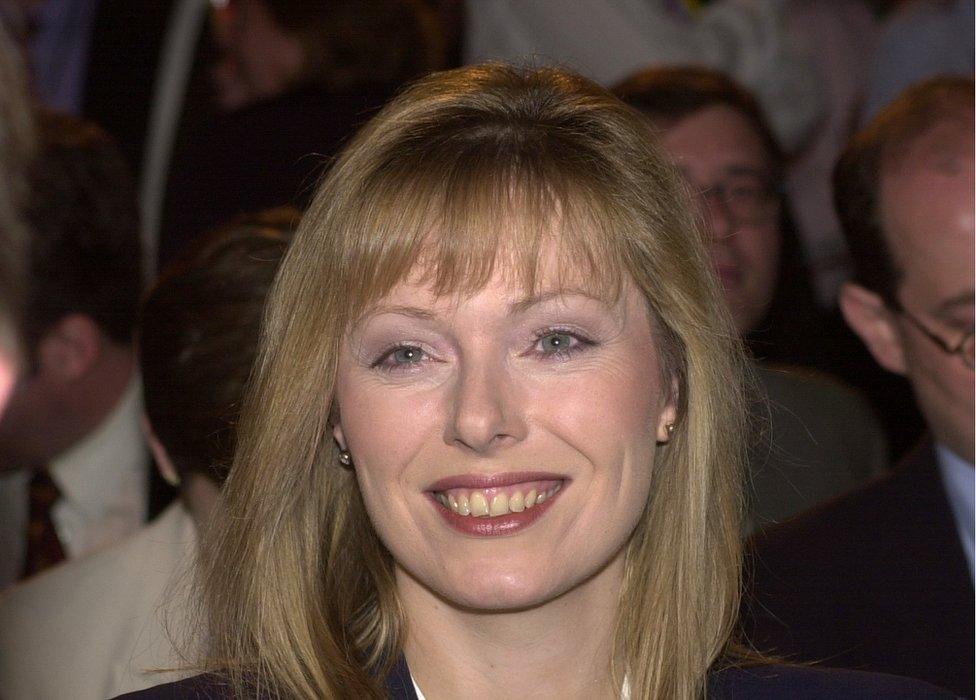
A volunteer at a Wikipedia-editing event realised author and broadcaster Ffion Hague, pictured in 2001, was only mentioned on her husband's page
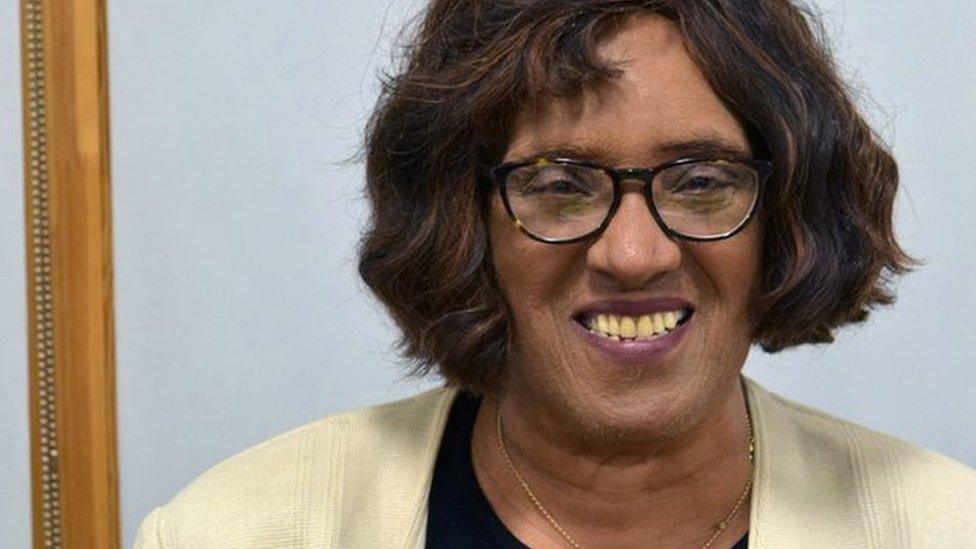
Wales' first black head teacher Betty Campbell was another high-profile "obvious miss" on Wikipedia
The National Library of Wales is also involved in similar efforts and shares its content with contributors. They employed "national wikimedian" Jason Evans five years ago.
"Articles about women make up about 18% of the profiles. During these events we frequently came across important women who didn't have an article on Wikipedia," he said.
"I remember one volunteer discovering that Ffion Hague, a notable author and broadcaster, had been bundled into her husband's [Lord Hague's] article. She now, rightly, has her own article."
Betty Campbell, Wales' first black head teacher, and Tori James, the first Welsh woman and youngest-ever British woman to climb Everest, were also "obvious misses" who have now been added.
"It's so important that the achievements of these amazing women are celebrated and available online," he said.
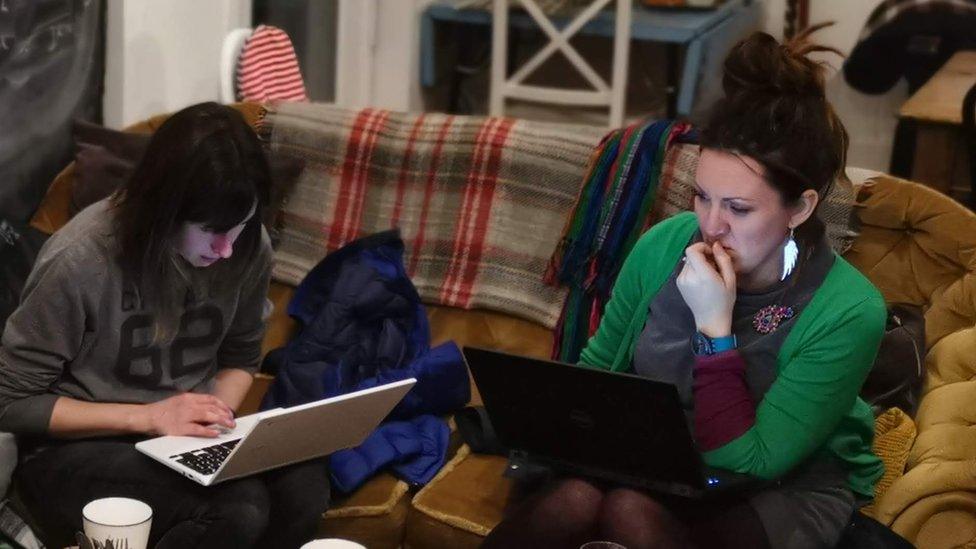
Elin Crowley and Sara Wheeler set aside an evening to ensure more women from Machynlleth in mid Wales were recorded on wikipedia
As part of his job he supported an event this week organised by Machynlleth-based artist Nicky Arscott in the run-up to International Women's Day. She wanted to add more women to the list of notable residents of the town, after realising almost all of those featured were men.
Ten volunteers, mostly women, joined her at a cafe in the town, writing and editing articles in Welsh and English. They found four women for Machynlleth's list of notable residents, including artists Meri Wells and Annie Morgan Suganami.
"It's difficult finding people who are 'notable' and doing it right so articles don't get removed by editors. That can be demoralising," Ms Arscott said.
"It isn't something that I used to think about very much, but since I started to edit Wikipedia I realised that a lot of it is to do with having the confidence to say 'yes, this thing or this person is important or note-worthy', and to then have the tools to confidently create and update the articles.
"Helping to add more voices feels like a positive, concrete action because it is always - however small - a step towards making Wikipedia more accurately reflect everybody's voice, and everybody's history. The best thing is that anybody can do it."
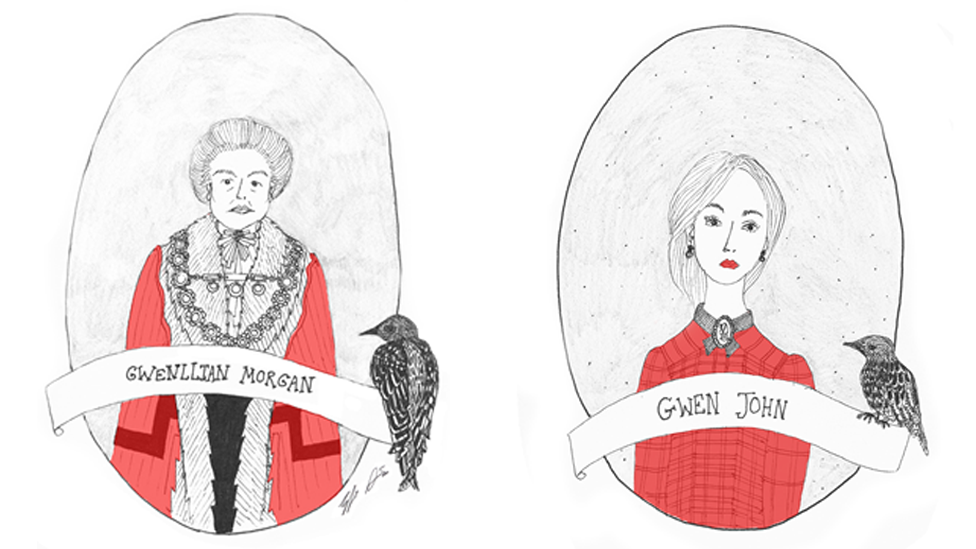
Gwenllian Morgan, the first female mayor in Wales, and artist Gwen John were the first women featured on the Drudwen blog
Running her own website means blogger Ms Lois does not need to worry about her work being removed, but finding information on forgotten female figures can be a challenge.
For International Women's Day she has returned to her original inspiration - and unearthed a Welsh woman who worked in building design.
She alighted on Norah Dunphy from Llandudno who - according to newspaper reports in the 1920s - was the first woman in Britain to achieve a degree in architecture.
"If you can see it, you can be it. It's important to see women in the occupations you dream of doing," she said.
- Published4 October 2018
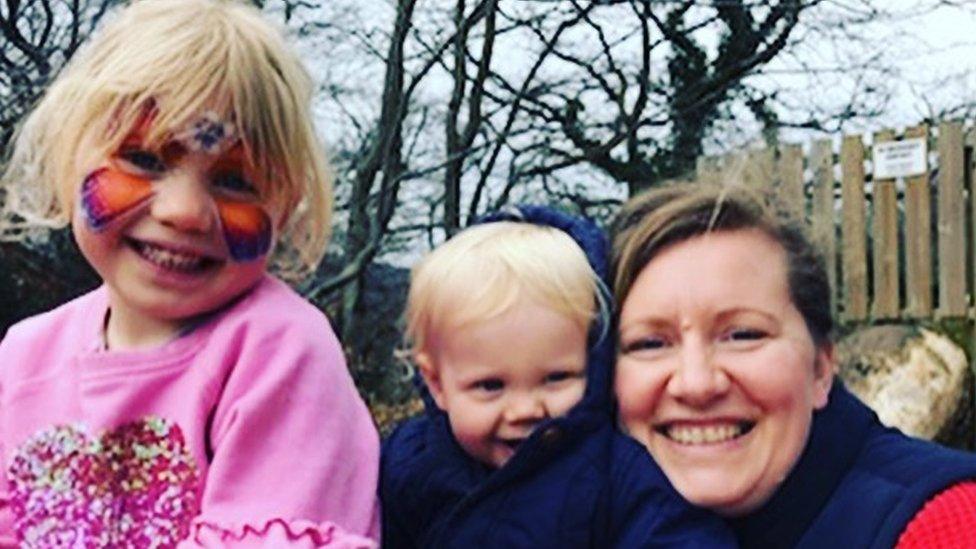
- Published18 February 2017
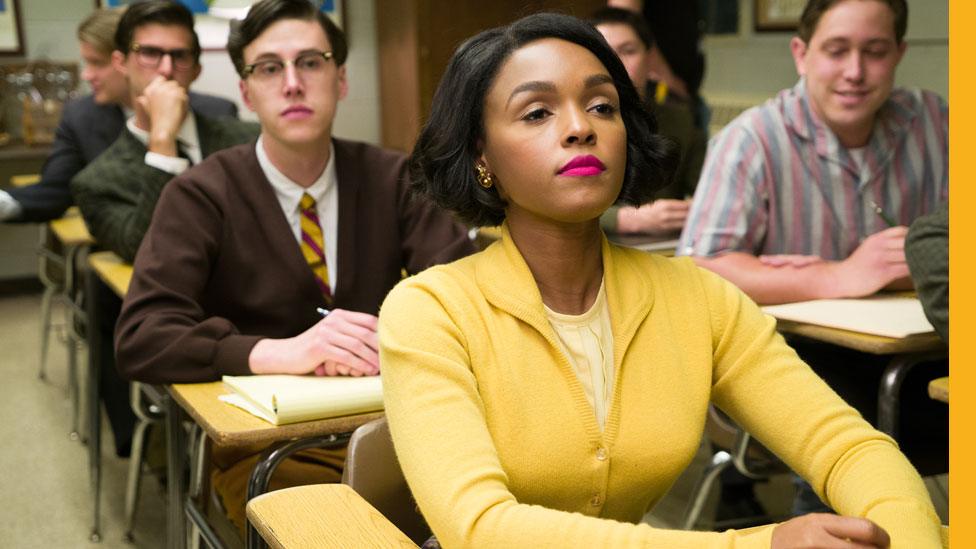
- Published18 January 2019
